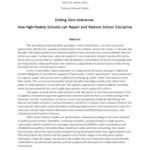Ending Zero-Tolerace: How High Poverty Schools can Repair and Restore School Discipline

View/
Author
Ahn, Chris J.
Subject
Washington and Lee University, Shepherd Poverty Program
Educational equalization
Restorative justice in schools
Discrimination in education
Metadata
Show full item recordDescription
Chris Ahn is a member of the Class of 2016 of Washington and Lee University. Capstone; [FULL-TEXT FREELY AVAILABLE ONLINE] The prevailing school discipline paradigm in the United States is actively racist and systemically robs the fair equality of opportunity from students across the nation. In the past few decades, the highly punitive zero-tolerance policies have resulted in an unprecedented wave of school exclusion. Furthermore, while all students in zero-tolerance schools may be affected by these policies, black students, students with disabilities, and students of low-income background are impacted at a disproportionate rate and face a substantially increased chance of becoming funneled into the criminal justice system.
In the United States, where education is a requirement of justice because it fulfills the societal obligation to provide fair equality of opportunity, schools have found it more convenient to suspend, expel, and incarcerate troubled and challenging youths rather than actually meet their needs. The current overly-punitive school discipline paradigm needs to be reformed in order to make education universally just. The systemic oppression of black students and other minorities promoted by this policy adds even greater moral urgency for reform.
This paper provides three interventions in the discussion of zero-tolerance policies. First, it supplies a normative argument against zero-tolerance policies that is currently lacking in the literature; second, it attempt to construct a more just disciplinary model by identifying four abstract principles of justice in school discipline; and third, it analyzes and compares three of the most popular alternative school discipline models gaining traction in the movement to end zero-tolerance: School-wide Positive Behavioral Interventions (SWPBIS) Restorative Justice, and Collaborative & Proactive Solutions.
While none of these models are perfect when analyzed according to the three-fold test of political and economic feasibility, moral permissibility, and practicality in a high-poverty community, both RJ and CPS are a stronger alternatives to SWPBIS in their preventative and rehabilitative qualities. And while these models are costly and time-consuming, they would dramatically reduce the educational inequities facing developmentally challenged students, and effectively block the school-to-prison pipeline at its earlier stages in the education system. Ultimately, I hope this paper can convince the reader that zero-tolerance policies are ethically intolerable in our democratic society, and can progress the discussion on viable alternative frameworks. Chris Ahn